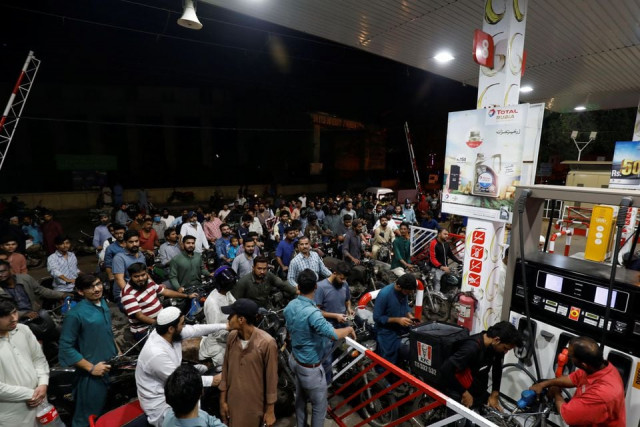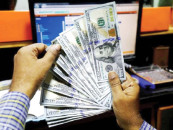Tax receipts from POL items jump 72%
Imposition of sales tax on oil at import stage drives higher collection

The Federal Board of Revenue (FBR) has raised over Rs287 billion in indirect taxes from petroleum products during the first seven months of the current fiscal year -up by 72%, indicating that petroleum products still remain a key source for revenue generation.
The taxes were collected from July to January of fiscal year 2021-22 on account of customs duty and general sales tax, showed the figures compiled by the FBR. Although the customs duty rates remained unchanged after the government doubled those in the budget, Prime Minister Imran Khan shifted the sales tax rates during fortnightly reviews of the prices. But still, the government has pooled Rs287 billion under the heads of customs duty and sales tax on petrol, crude oil, high-speed diesel and furnace oil.
The collection was Rs120 billion or 72% higher than the corresponding period of the previous fiscal year. During the first seven months of the ongoing fiscal year, the country spent Rs1.4 trillion on the import of four petroleum products -which was Rs750 billion or 120% higher than the comparative period of last fiscal year. The data suggested that the taxation on petroleum products along with the increase in their prices in the international market remained key factors behind record per litre price hike in petrol and high-speed diesel.
Prime Minister Imran Khan deferred the proposed increase in the petroleum products’ prices with effect from February 1 and instead, called for reduction in the petroleum levy and sales tax rates. The sales tax on petrol has been further slashed to Rs0.79 per litre against the standard 17% while it is reduced to Rs3.17 per litre on high-speed diesel. However, one of the major reasons behind the higher collection was the imposition of 17% sales tax on crude oil at the import stage and increase in customs duty on import of petrol from 5% to 10% in the budget.
The government has not changed these rates since June. The seven-month customs duty collection on the import of these four petroleum products stood at Rs84.4 billion -higher by Rs48 billion or 133%. Similarly, the sales tax collection at the import stage on these items also increased to Rs163 billion against last year’s figure of Rs70 billion. In addition to that, Rs40 billion sales tax was also collected at the local stage, which was 35% lower than previous year because of change in taxation from domestic to import stage in the budget. The Rs287 billion collection was equal to 8.5% of the total taxes that the FBR collected during the JulyJanuary period.
Last year, this ratio was 6.5%, showed the numbers. The data compiled by the FBR relating to duties and taxes highlights heavy indirect taxation that has been hurting the consumers badly. Due to the increasing share of the import taxes, the share of the indirect taxes in overall tax collection has gone up to 66%, which is hurting the poor and middle-income groups more than the rich class. In July-January, the FBR collected Rs70 billion in taxes on the import of petrol on account of customs duty and sales tax. This was higher by nearly one-third or Rs17 billion. The customs duty collection on petrol import was Rs36 billion in seven months, which was higher by nearly 290%, thanks to the government’s decision to double the customs duty rate to 10% in July last year.
The crude oil imports fetched over Rs92 billion in taxes at the import stage alone, up by 536% or nearly Rs78 billion after the government slapped 17% general sales tax on crude oil import in the budget. Out of Rs92 billion, the sales tax collection was close to Rs80 billion. The FBR collected over Rs59 billion on import of high speed dieselhigher by 100% or Rs30 billion. These numbers suggest that the import taxes were one of the key reasons behind historically high petroleum product prices in Pakistan. The depreciation of the rupee against the US dollar also added fuel to the fire.
The higher prices of diesel are also causing inflation as there has been an increase in transport fares and an upsurge in the cost of agriculture produce in areas where the canal water is not available. The government also collected Rs25 billion on the import of furnace oil, which was also higher by 184%. The furnace oil import significantly increased due to the government’s decision to use it for running power plants after LNG became expensive. In a briefing to the finance minister this week, the FBR said that it was facing two key challenges - slowdown in imports and reduction in sales tax on petroleum products - to meet this year’s revised tax target of over Rs6.1 trillion.
However, the numbers indicated that despite the reduction in rates, the FBR was enjoying windfall gains of the global commodity prices. But the government has taken a hit of Rs205 billion on account of petroleum levy collection during the first half of the current fiscal year. The Ministry of Finance reported this week that during the July-December period, the petroleum levy collection stood at Rs70 billion as against Rs275 billion in the last fiscal year. But levy collection has nothing to do with the FBR’s targets.



















COMMENTS
Comments are moderated and generally will be posted if they are on-topic and not abusive.
For more information, please see our Comments FAQ